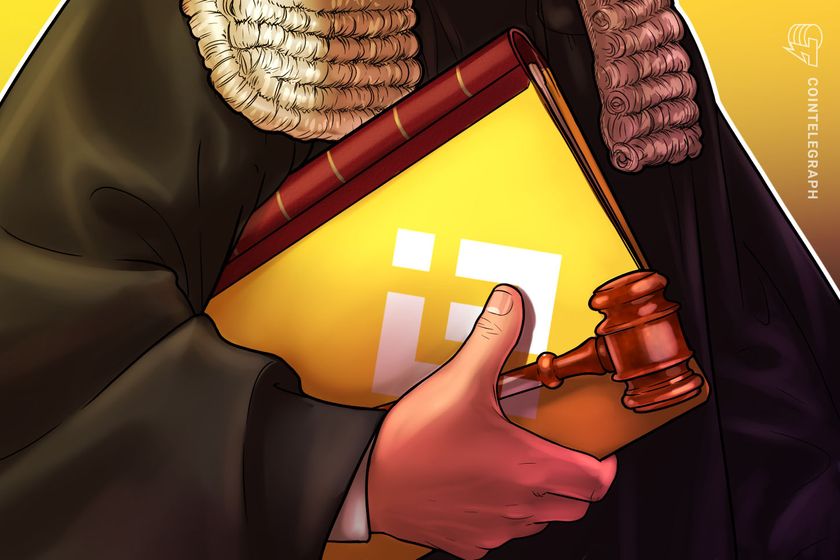
Only 0.4% of the 14 million crypto wallets that have interacted with Pump.fun have made a profit of over $10,000 — indicating that Burwick’s client base may be in the millions.
A US crypto law firm says it is looking to launch legal action on behalf of investors who have suffered losses due to the Solana memecoin launchpad Pump.fun.
“Today, Burwick Law is announcing publicly that we are pursuing legal action on behalf of investors in pumpdotfun memecoins,” said Burwick Law in a Jan. 15 post on X.
Burwick said the move followed “months” of working with everyday people who lost “significant amounts of money” to memecoins, rug pulls, and unfulfilled promises on platforms like Pump.fun.

The Supreme Court has denied a petition to review a lower court decision that securities laws applied to Binance.
The US Supreme Court has declined to hear an appeal from crypto exchange Binance and its founder, Changpeng “CZ” Zhao, regarding a class-action lawsuit by investors who alleged the exchange illegally sold unregistered tokens that lost significant value.
On Jan. 13, the Supreme Court of the United States denied a petition to review a lower court ruling that US securities laws applied to the crypto exchange, even though it doesn’t have a physical headquarters in America.
In March, a lower court ruled the case could proceed because token purchases were finalized in the US and transactions took place on US servers, despite Binance not being an American company.

Nvidia has lost a Supreme Court challenge to try stop an investor-led lawsuit that says it understated its GPU sales to crypto miners.
Nvidia will have to face a class-action suit alleging it misled investors about the volume of sales to crypto miners after the United States Supreme Court dismissed the chip maker’s appeal to throw it out.
The justices issued a single-line order dismissing Nvdia’s appeal on Dec. 11, providing no explanation. It now reinstates an appellate court’s decision that revived the suit, which a California district court initially dismissed in March 2021.
Nvidia was looking to overturn the Ninth Circuit appeals court ruling from last August that revived a 2018 suit from a group of Nvidia shareholders claiming the firm hid over $1 billion in GPU sales made to crypto miners and that CEO Jensen Huang downplayed the volume of sales to the industry.

The lawyer for two OpenSea users who accused the platform of selling them securities told Cointelegraph they “had no choice but to dismiss the pending case.”
Two OpenSea users accusing the non-fungible token marketplace of selling unregistered securities have dropped their proposed class-action lawsuit after a judge allowed the firm to demand arbitration.
On Nov. 7, Anthony Shnayderman and Itai Bronshtein filed a voluntary dismissal of their securities suit against Ozone Networks, which does business as OpenSea, in a Florida federal court after Judge Cecilia Altonaga allowed OpenSea to file a motion to compel the pair into arbitration in an order last month.
OpenSea had held firm that it would compel the two users into arbitration, claiming in an October filing that they agreed to its terms of use that say all claims would be resolved by an arbitrator — including if the claims should be arbitrated in the first place.
 A new class action lawsuit was initiated against the San Francisco-based cryptocurrency exchange Coinbase on May 3. The legal action claims that Coinbase deliberately sold securities that are unregistered with regulatory authorities. Additionally, the lawsuit charges Coinbase with operating as an unregistered securities broker. Lawsuit Alleges Coinbase Illegally Sold Securities Without Registration According to legal […]
A new class action lawsuit was initiated against the San Francisco-based cryptocurrency exchange Coinbase on May 3. The legal action claims that Coinbase deliberately sold securities that are unregistered with regulatory authorities. Additionally, the lawsuit charges Coinbase with operating as an unregistered securities broker. Lawsuit Alleges Coinbase Illegally Sold Securities Without Registration According to legal […]
The soccer star’s Binance-tied NFTs allegedly promoted investments in unregistered securities on the crypto exchange.
Pro-soccer star Cristiano Ronaldo has been hit with a proposed class-action lawsuit from plaintiffs claiming they suffered losses from his promotion of the now-legally embroiled crypto exchange Binance.
A Nov. 27 filing to a Florida District Court claimed Ronaldo “promoted, assisted in, and/or actively participated in the offer and sale of unregistered securities in coordination with Binance.”
Binance entered a multi-year partnership with Ronaldo in mid-2022 to promote a series of his own nonfungible tokens (NFT), of which he has at least three collections tied to Binance.
The complaint claims users who signed up for Ronaldo’s NFTs were more likely to use Binance for other purposes — including investing in what they claimed were unregistered securities, including Binance’s BNB (BNB) and its crypto yield programs.
“Ronaldo’s promotions solicited or assisted Binance in soliciting investments in unregistered securities by encouraging his millions of followers, fans, and supporters to invest with the Binance platform.”
Ronaldo was a key part of Binance’s growing popularity due to his influence and reach, with 850 million followers across social media, says the complaint. They allege his NFT sales were “incredibly successful” at promoting the exchange, with a 500% increase in searches for “Binance” the week following the initial sale.
Cooking something up with @binance https://t.co/FMAP5GAdxE
— Cristiano Ronaldo (@Cristiano) November 28, 2023
The suit alleges Ronaldo knew or should have known “about Binance selling unregistered crypto securities” as he has “investment experience and vast resources to obtain outside advisers.”
Related: Why Binance’s US plea deal could be positive for crypto adoption
The suit cited Securities and Exchange Commission guidance, which warned celebrities of the need to disclose payments received for promoting cryptocurrencies — which the complaint claims Ronaldo didn’t do.
The class action plaintiffs are Michael Sizemore, Mikey Vongdara and Gordon Lewis, who seek damages and funds to cover legal fees.
Meanwhile, Binance and founder Changpeng “CZ” Zhao is facing their own legal woes, pleading guilty and paying a $4.3 billion settlement to the United States on money laundering charges and running an unregistered money-transmitting business.
Zhao stepped down as CEO and faces up to 18 months in prison. Binance agreed to up to five years of Justice Department and Treasury compliance monitoring.
The SEC has sued Binance claiming — among other charges — that it sold unregistered securities and is reportedly investigating if Binance misappropriated customer funds.
Magazine: NFT Creator: DMT and a Hellboy outfit — How diewiththemostlikes got on SuperRare

Apple is facing the wrath of crypto users yet again as a popular Bitcoin Lightning wallet disappeared from its U.S.-facing App Store.
Bitcoin (BTC) Lightning payments app Wallet of Satoshi (WoS) has disappeared from Apple’s App Store and Google’s Play Store in the United States as it closes in on over 1 million transactions for November.
On Nov. 24, several users and crypto community participants shared on X (Twitter) their attempts to search for the WoS app, which turned up no results or redirected users to competing wallet apps.
Wallet of Satoshi banned in the US? pic.twitter.com/S44qN5UI2U
— ck (@ck_SNARKs) November 23, 2023
However, the WoS app still appeared for download on the Australian Apple App Store and the Australian and Singapore Google Play Store versions at the time of writing.

Wallet of Satoshi is a popular Lightning payments platform that is on pace to process over 1.1 million Lightning payments in November, according to industry author and podcaster Kevin Rooke.
Wallet of Satoshi is on pace to process over 1.1 million Lightning payments in November.
— Kevin Rooke (@kerooke) November 22, 2023
This will be their largest month of Lightning payments ever.
⚡️ pic.twitter.com/oCxIce7kit
Rooke added that it would be the firm’s “largest month of Lightning payments ever.”
Apple and Wallet of Satoshi did not immediately respond to a request for more details.
Related: Demand for Bitcoin could grow by up to 10x within 12 months: Michael Saylor
Apple levies a hefty 30% tax on in-app payments, which it maintains a tight leash over and has been a barrier for crypto platforms wanting an App Store presence.
On Nov. 17, a group of disgruntled PayPal Venmo and Block Cash App users filed a class-action lawsuit against Apple, claiming the company had entered into anti-competitive agreements with PayPal and Block to restrict the use of crypto technology and payments on iOS.
Apple has a history of removing crypto apps, with the firm delisting the Nostr-based Damus app over a Bitcoin tip feature in June. It also briefly pulled the MetaMask wallet app from its App Store in October.
Magazine: Blockchain detectives — Mt. Gox collapse saw birth of Chainalysis

Apple faces a class action over alleged anti-competitive conduct in the iOS peer-to-peer payments market.
Disgruntled consumers have filed a class-action lawsuit against Apple claiming the tech giant has conspired to limit peer-to-peer payment options on its devices and block crypto technology from iOS payments apps.
The Nov. 17 complaint filed in a California District Court alleges Apple entered into anti-competitive agreements with PayPal’s Venmo and Block’s Cash App to restrict the use of decentralized cryptocurrency technology in payment apps, which caused users to pay "rapidly inflating prices."
“These agreements limit feature competition—and the price competition that would flow from it—marketwide, including by barring the incorporation of decentralized cryptocurrency technology within existing or new iOS Peer-to-Peer Payment apps,” the filing says.
The plaintiffs also claimed Apple uses “technological and contractual restraints,” including hardware-enforced App Store exclusivity and “contractual limitations on web browser technology” to “exercise unfettered control over every app installed and run on iPhones and iPads.”
With these restraints, Apple can — and does — force new to market iOS P2P payment apps to bar crypto "as a condition for entry," the suit claimed.

The plaintiffs describe themselves as customers who have paid inflated fees due to Apple’s restraints of trade across the iOS P2P payment market.
They seek to recover for excessive fees and overcharging due to Apple’s alleged anticompetitive conduct and injunctive relief barring the firm from continuing to enter into and enforce anticompetitive agreements restraining iOS P2P Payment Market competitors and would-be entrants.
Related: Apple’s 30% tax rules will stay for now, crypto and NFTs may have to wait
The 58-page class action details the history and rise of peer-to-peer payment apps and decentralized cryptocurrencies and Apple’s entry into this market.
In April, the Court of Appeals for the Ninth Circuit ruled Apple violated California’s competition laws by not allowing apps to direct users to non-Apple linked payment solutions.
Magazine: 6 Questions for Lugui Tillier about Bitcoin, Ordinals, and the future of crypto

The Estonia-based firm noted that only one plaintiff in the class action lawsuit is actually based in Colorado where the suit was filed.
The company behind Atomic Wallet has asked a United States court to dismiss a class action suit seeking damages from a $100 million hack arguing the claims should’ve been filed in Estonia where it's based.
In a Nov. 16 dismissal motion in a Colorado District Court the Estonian firm argued it has “no U.S. ties” and its end-user license agreement required all litigation against it be filed in its home country of Estonia.
Atomic also argued that only one user in Colorado was allegedly affected — which wasn
The firm also claimed the 5,500 allegedly affected Atomic users agreed to its terms of service which expressly disclaims liability for losses due to theft and limits damages to $50 per user

Atomic said the plaintiff’s negligence claims also lack legal merit because a legal duty was never created in which they were to maintain Atomic Wallet’s security and to protect against hacking.
Related: Crypto exchange Upbit targeted by hackers 159K times in H1: Report
"This Court has repeatedly rejected similar claims because Colorado recognizes no such duty,” it wrote.
Allegations of fraudulent misrepresentation were also struck down by the Estonian-based wallet provider.
The plaintiffs launched the class action in August, two months after a $100 million exploit on Atomic Wallet took place with up to 5,500 users affected — with both North Korean and Ukrainian groups blamed for the attack.
Magazine: Should crypto projects ever negotiate with hackers? Probably

A U.S. District Court has upheld claims by HBZ investors that the company acted fraudulently and also asserted that its token violated securities laws.
A United States District Court has allowed a nearly three-year-long class action lawsuit against the creators of HelbizCoin to go ahead, as per a court ruling filed on Sept. 1.
The class action suit was first brought against Helbiz, its CEO Salvatore Palella, and its partners in 2020, with an amended complaint filed in March 2022.
The case involves an Italian electric scooter-sharing company HelBiz that raised $38.6 million in an ICO and issued an ERC-20 token with one of the founders of Ethereum, Anthony Di Iorio, in 2018, according to the complaint.
A group of investors, numbering as many as 20,000, alleged that HelbizCoin was a rug pull and fraudulent pump-and-dump scheme with the firm making false statements and promises to induce people to purchase the coins. They claimed that Helbiz kept most of the money from the ICO for itself.
On Sept. 1, the US District Court for the Southern District of New York partially ruled in favor of investors who filed the class action suit, with the court granting the motions to dismiss in part and denied them in part.

The court however dismissed all claims against certain defendants entirely, including Paysafe, Skrill, Decentral, and Alphabit, finding a lack of personal jurisdiction over Paysafe and Alphabit. The court also dismissed some claims against the remaining defendants for failure to state a claim, including breach of contract, tortious interference, and certain securities claims.
However, Judge Louis Stanton also ruled that plaintiffs adequately stated claims for fraud, price manipulation, violations of securities laws, commodities laws, the RICO (Racketeer Influenced and Corrupt Organizations) Act, and unjust enrichment against some defendants.
“Among other matters, the case found that the ERC-20 token is a security under federal law,” the investor’s lawyer Michael Kanovitz told Cointelegraph.
The investors' lawsuit was initially dismissed by a lower court judge in January 2021, citing a 2010 Supreme Court precedent that limited the extraterritorial reach of federal securities laws, according to a report from Reuters.
However, the case was revived in October 2021 when a 2nd U.S. Circuit Court of Appeals found the lower court judge erred in its decision, and an amended complaint was filed in March 2022.
Related: SEC vs. Coinbase: New lawyer Patrick Kennedy joins fight
In emailed comments to Cointelegraph, Kanovitz also pointed out that the complaint included a number of charts that use the Ethereum ledger to “prove spoof trading in the ICO.” It also included evidence of multiple "genesis wallets" that were provided to the initial investors in Ethereum, such as Mr. Di Iorio, he said before adding:
“It is a compelling story that shows how blockchain transparency can be used to flush out criminals.”
The complaint alleged that Di Iorio, an advisor to Helbiz, published false and misleading statements about the HelbizCoin ICO in Bitcoin Magazine but did not provide evidence that he made the statements.
“This is a speculative conclusion at best and thus fails to adequately allege that Di Iorio made false or misleading statements,” the ruling read.
Magazine: Crypto regulation: Does SEC Chair Gary Gensler have the final say?